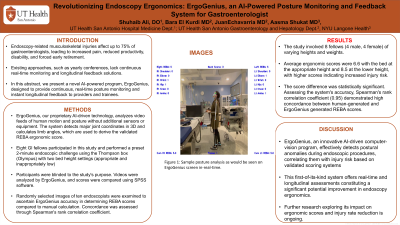Tuesday Poster Session
Category: General Endoscopy
P3393 - Revolutionizing Endoscopy Ergonomics: Align, an AI-Powered Posture Monitoring and Feedback System for Gastroenterologists
Tuesday, October 24, 2023
10:30 AM - 4:00 PM PT
Location: Exhibit Hall

Has Audio
- SA
Shuhaib Ali, MD
UT Health San Antonio
San Antonio, TX
Presenting Author(s)
Shuhaib Ali, MD, Bara El Kurdi, MD
UT Health San Antonio, San Antonio, TX
Introduction: Endoscopy-related musculoskeletal injuries affect up to 75% of gastroenterologists, leading to increased pain, reduced productivity, disability, and forced early retirement. Existing approaches, such as yearly conferences, lack continuous real-time monitoring and longitudinal feedback solutions. In this abstract, we present a novel AI-powered program, Align, designed to provide continuous, real-time posture monitoring and instant longitudinal feedback to providers and trainees.
Methods: Align, our proprietary AI-driven technology, analyzes video feeds of human motion and posture without additional sensors or equipment. The system detects major joint coordinates in 3D and calculates limb angles, which are used to derive the validated REBA ergonomic score. Eight GI fellows participated in this study and performed a preset 2-minute endoscopic challenge using the Thompson box (Olympus) with two bed height settings (appropriate and inappropriately low). Participants were blinded to the study's purpose. Videos were analyzed by Align, and scores were compared using SPSS software. Randomly selected images of ten endoscopists were examined to ascertain Align's accuracy in determining REBA scores compared to manual calculation. Concordance was assessed through Kendall's tau and Spearman's rank correlation coefficient.
Results: The study involved 8 fellows (4 male, 4 female) of varying heights and weights. Average ergonomic scores were 6.6 with the bed at the appropriate height and 8.5 at the lower height, with higher scores indicating increased injury risk. The score difference was statistically significant. Assessing the system's accuracy, Kendall's tau (-0.47) and Spearman's rank correlation coefficient (0.95) demonstrated high concordance between human-generated and Align-generated REBA scores.
Discussion: Align, an innovative AI-driven computer-vision program, effectively detects postural anomalies during endoscopic procedures, correlating them with injury risk based on validated scoring systems. This first-of-its-kind system offers real-time and longitudinal assessments constituting a significant potential improvement in endoscopy ergonomics. Further research exploring its impact on ergonomic scores and injury rate reduction is ongoing.

Disclosures:
Shuhaib Ali, MD, Bara El Kurdi, MD. P3393 - Revolutionizing Endoscopy Ergonomics: Align, an AI-Powered Posture Monitoring and Feedback System for Gastroenterologists, ACG 2023 Annual Scientific Meeting Abstracts. Vancouver, BC, Canada: American College of Gastroenterology.
UT Health San Antonio, San Antonio, TX
Introduction: Endoscopy-related musculoskeletal injuries affect up to 75% of gastroenterologists, leading to increased pain, reduced productivity, disability, and forced early retirement. Existing approaches, such as yearly conferences, lack continuous real-time monitoring and longitudinal feedback solutions. In this abstract, we present a novel AI-powered program, Align, designed to provide continuous, real-time posture monitoring and instant longitudinal feedback to providers and trainees.
Methods: Align, our proprietary AI-driven technology, analyzes video feeds of human motion and posture without additional sensors or equipment. The system detects major joint coordinates in 3D and calculates limb angles, which are used to derive the validated REBA ergonomic score. Eight GI fellows participated in this study and performed a preset 2-minute endoscopic challenge using the Thompson box (Olympus) with two bed height settings (appropriate and inappropriately low). Participants were blinded to the study's purpose. Videos were analyzed by Align, and scores were compared using SPSS software. Randomly selected images of ten endoscopists were examined to ascertain Align's accuracy in determining REBA scores compared to manual calculation. Concordance was assessed through Kendall's tau and Spearman's rank correlation coefficient.
Results: The study involved 8 fellows (4 male, 4 female) of varying heights and weights. Average ergonomic scores were 6.6 with the bed at the appropriate height and 8.5 at the lower height, with higher scores indicating increased injury risk. The score difference was statistically significant. Assessing the system's accuracy, Kendall's tau (-0.47) and Spearman's rank correlation coefficient (0.95) demonstrated high concordance between human-generated and Align-generated REBA scores.
Discussion: Align, an innovative AI-driven computer-vision program, effectively detects postural anomalies during endoscopic procedures, correlating them with injury risk based on validated scoring systems. This first-of-its-kind system offers real-time and longitudinal assessments constituting a significant potential improvement in endoscopy ergonomics. Further research exploring its impact on ergonomic scores and injury rate reduction is ongoing.

Figure: Figure 1. Sample posture analysis as would be seen on Align screen in-real-time.
Disclosures:
Shuhaib Ali indicated no relevant financial relationships.
Bara El Kurdi indicated no relevant financial relationships.
Shuhaib Ali, MD, Bara El Kurdi, MD. P3393 - Revolutionizing Endoscopy Ergonomics: Align, an AI-Powered Posture Monitoring and Feedback System for Gastroenterologists, ACG 2023 Annual Scientific Meeting Abstracts. Vancouver, BC, Canada: American College of Gastroenterology.

